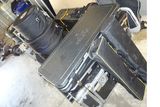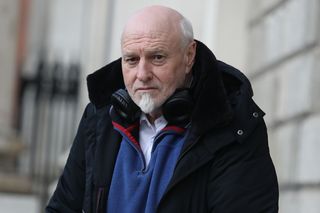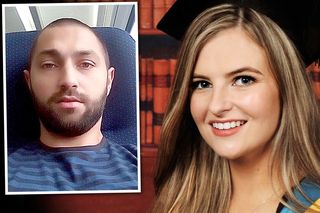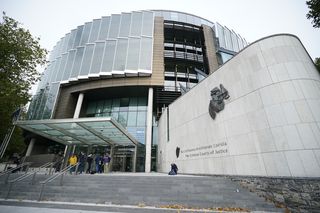'My generation feels confused, a bit divided' - London-Irish rapper Maverick Sabre talks vulnerability, Nile Rogers, and nationality
London-Irish rapper Maverick Sabre on working with Nile Rodgers at Abbey Road, men allowing themselves to be vulnerable and the thorny issue of nationality
Hip-hop export: Maverick Sabre moved to London after competing his Leaving Cert. Picture by Damien Eagers
The rising hip-hop star and in-demand producer and songwriter Maverick Sabre - or plain old Michael Stafford to his former classmates in New Ross, Co Wexford - is chatting about his impressive new album, when the B-word raises its ugly head.
"There's no getting away from it," the London-based musician says. "It's something that we're having to think about all the time."
He is, of course, referring to Brexit.
"My generation feels confused," he says.
His accent is a curious mix of London and the sunny South East.
"It feels a bit divided. It feels removed - that's the big thing. People are feeling disenfranchised from what's going on. We've almost become desensitised to political change."
Stafford believes Brexit has reopened old wounds.
"There's so much rhetoric being used against working-class people. Classism is the divide and everything underneath that is manufactured to uphold that divide."
Now 28, he is regarded as one of the country's finest hip-hop exports, although he says he likes to think of his music as encompassing much more than rap. He's right, too: he's a soulful singer and there's a significant breadth of genres that has influenced his new album, When I Wake Up.
"I soak in so much in music," he says. "Even though I was a hip-hop head and an MC, I'd listen to everything from Korn to Damien Dempsey to [MC] Bravado. Tupac Shakur was a big influence to me when I was younger. He was a character from a lifestyle and background I had no connection to, but he was able to say things in his lyrics that were like, 'F***ing hell, he's actually speaking to me!'"
Stafford hopes his music has the same effect on young listeners, and he believes the key is to allow his vulnerabilities to come through in song.
"I think when you're honest and not hiding anything in your music, you can really connect with your listener," he says.
"I remember recently sitting down with a group of friends, all fellas. There were English and Irish and there were about eight of us. One of us brought up a discussion about problems they had been having 'downstairs'. We started speaking about it. Me and a couple of friends started talking about it and then the other fellas who are normally more macho, and who wouldn't be giving away personal information, started coming out with very personal stuff. And they spoke very openly because one of us had been vulnerable, and hadn't been afraid of that, and it's exactly the same in music."
Stafford was born in London to an English mother and an Irish father. The family moved to New Ross when he was four. He adjusted to his new life comparatively easily and music played a part.
"My father taught me guitar when I was eight," he says. "And I really started to get into it when I was 13, 14. I started trying to write my own songs. I was never out there telling people, 'I'm going to be this, I'm going to be that'. It was more a quiet confidence that I just had in me. Music is always how I've connected with people, how I've expressed myself, how I talk and feel free. Nothing else makes me feel like this."
He completed the Leaving Cert at 16 and moved back to London the following year. But while he made his name from the other side of the Irish Sea, it was the scene here that helped set him on the right course.
"The Irish hip-hop scene is the reason I even got to this point," he says. "But it was quite small, and back then it wasn't massively supported by the mainstream media. It's far better now, and I'm happy about that for the younger generations. But we had our inspirations that came before like Scary Éire, and Messiah J and the Expert. The first acts I ever met were Urban Intelligence, Correkt Minds and DJ Snuff, who was a London-based Northern Irish DJ."
It was London, however, that made him and he was already re-established there when he released his first album, the acclaimed Lonely Are the Brave in 2012.
"I owe London a hell of a lot and I've always been very connected to the music there, especially from MCs in the part of London I'd grown up in [Hackney]. I always felt it was a place I was going to go to."
He says he enjoys collaborating and has worked with everyone from Jorja Smith to Nile Rodgers. The former appears on 'Slow Down', one of the standout singles from the new album, while he's been writing new songs with the latter at Abbey Road.
His admiration for the Chic leader is palpable. "I met Nile during a writing session with Jorja in Abbey Road [studios]. We've written a couple of times together. Everyone knows him and his A1 catalogue and how broad of a musical spectrum he's touched over the years, but what's really interesting is how he writes. He does it in a very simple way. He doesn't like to overcomplicate things. He communicates through rhythm."
Stafford says the experience has been invaluable. "He's got his guitar on him - the same one he writes everything on. It's his $2bn guitar. And he'll play something and it will hopefully spark something in you."
Famously, Rodgers uses a 1959 Fender Stratocaster, and it's said that he has written some $2bn worth of hits on it.
"When you're working with him, you're in an uncomfortable space, completely out of your normal zone," he adds, "but that ensures that your creative senses are really heightened."
Abbey Road inspires him, too.
"There's such a weight of history there," he says. "The other day, someone I was working with pointed out a note with the original string arrangement for [The Beatles'] 'Yesterday' on the wall. You'd see pictures of Kate Bush in Studio One. You're constantly reminded of the music that's been created there down through the years."
Stafford says he is proud to be Irish - and, with some form of Brexit looming, he is glad to have a harp on the cover of his passport. He says the issue of nationality is a thorny one, but feels 'London-Irish' is the term that bests describes him now.
"It's not English, it's London," he says. "It's very different. The city is such a melting pot."
He is very well placed to talk about Declan Rice, the West Ham footballer who changed allegiance from Ireland to England earlier this year. Many Irish sports fans are still smarting from the decision.
"That whole situation boils down to the bigger problem here," he says. "We are more outraged by the individual than by the system that created the problem. Why are we battering this young fella? If we were in his situation, most of us would have done what he did. He doesn't owe anything to anyone. He's a young fella - let him do his thing. Why waste energy on that? Why not put our f***ing energy into the FAI and develop really good young players?
"And besides," he adds, "we'd all be in a better place if we didn't get so hung up on nationality."
'When I Wake Up' is out on Friday. Maverick Sabre plays Cyprus Avenue, Cork, on March 29 and The Academy, Dublin, on March 30
Join the Irish Independent WhatsApp channel
Stay up to date with all the latest news














